- Home
- Haruki Murakami
Sputnik Sweetheart Page 9
Sputnik Sweetheart Read online
Page 9
“I’m sorry I’m so late,” she said. “I had to go to the police station, and all the paperwork took a long time. And I never imagined you’d be here today. Tomorrow at noon at the earliest, I thought.”
“I managed to make all my connections,” I said. The police station?
Miu looked straight at me and smiled faintly. “If it’s all right with you, why don’t we go have something to eat and talk there. I’ve only had breakfast today. How about you? Are you hungry?”
“You’d better believe it,” I replied.
She led me to a taverna on a side street near the harbor. There was a charcoal grill set up near the entrance, and all kinds of fresh-looking seafood cooking away on the iron grate. Do you like fish? she asked, and I said I did. Miu spoke to the waiter, ordering in broken Greek. First he brought a carafe of white wine, bread, and olives. Without any toasts or further ado, we poured ourselves some wine and started drinking. I ate some of the coarse bread and a few olives to ease my hunger pangs.
Miu was beautiful. My first impression was of that clear and simple fact. No, maybe it wasn’t that clear and that simple. Maybe I was under some terrible mistaken impression. Maybe for some reason I’d been swallowed up in some other person’s unalterable dream. Thinking about it now, I can’t rule out that possibility. All I can say for sure is that at that moment I saw her as an extremely lovely woman.
Miu wore several rings on her slim fingers. One was a simple gold wedding band. While I tried hurriedly to mentally put my first impressions of her in some kind of order, she gazed at me with gentle eyes, taking an occasional sip of wine.
“I feel like I’ve met you before,” she said. “Perhaps because I hear about you all the time.”
“Sumire’s told me a lot about you, too,” I said.
Miu beamed. When she smiled, and then only, charming small lines appeared at the corners of her eyes. “I guess we can forgo introductions, then.”
I nodded.
What I liked most about Miu was that she didn’t try to hide her age. According to Sumire, she must be thirty-eight or thirty-nine. And indeed she looked that age. With her slim, tight figure, a little makeup and she’d easily pass for late twenties. But she didn’t make the effort. Miu let age naturally rise to the surface, accepted it for what it was, and made her peace with it.
Miu popped an olive into her mouth, grasped the pit with her fingers, and, like a poet getting the punctuation just right, gracefully discarded it in an ashtray.
“I’m sorry to call you up like that in the middle of the night,” she said. “I wish I could have explained things better then, but I was too upset and didn’t know where to begin. I’m still not totally calm, but my initial confusion has settled a bit.”
“What in the world happened?” I asked.
Miu brought her hands together on the table, separated them, brought them together again.
“Sumire has disappeared.”
“Disappeared?”
“Like smoke,” Miu said. She took a sip of wine.
She continued. “It’s a long story, so I think I’d better start at the beginning and tell it in the right order. Otherwise some of the nuances might not come through. The story itself is quite subtle. But let’s eat first. It’s not like each second counts right now, and it’s hard to think straight if you’re hungry. Also, it’s a bit too noisy to talk here.”
The restaurant was filled with Greeks gesturing and talking boisterously. So that we didn’t have to shout at each other, Miu and I leaned forward across the table, our heads close together as we talked. Presently the waiter brought over a heaping plate of Greek salad and a large grilled whitefish. Miu sprinkled some salt on the fish, squeezed out half a lemon, and dripped some olive oil onto her portion. I did the same. We concentrated on eating for a while. As she said, first things first. We needed to assuage our hunger.
How long could I stay here? she asked. The new term begins in a week, I replied, so I have to be back by then. Otherwise things will be a bit sticky. Miu gave a matter-of-fact nod. She pursed her lips and seemed to be figuring out something. She didn’t say anything predictable, like “Don’t worry, you’ll be back by then,” or “I wonder if things’ll be all settled by then.” She came to her own private conclusion, which she tucked away in a drawer, and silently went back to her meal.
After dinner, as we were having coffee, Miu broached the subject of the airfare. Would you mind taking the amount in traveler’s checks? she asked. Or else I could have the money transferred to your account in yen after you return to Tokyo. Which do you prefer? I’m not strapped for funds, I answered, I can pay it myself. But Miu insisted on paying. I’m the one who asked you to come, she said.
I shook my head. “It’s not like I’m being polite or anything. A little bit later on, and I probably would have come here of my own accord. That’s what I’m trying to say.”
Miu gave it some thought and nodded. “I am very grateful to you. For coming here. I can’t tell you how much.”
When we left the restaurant, the sky was a brilliant splash of colors. The kind of air that felt like if you breathed it in, your lungs would be dyed the same shade of blue. Tiny stars began to twinkle. Barely able to wait for the long summer day to be over, the locals were out for an after-dinner stroll around the harbor. Families, couples, groups of friends. The gentle scent of the tide at the end of the day enveloped the streets. Miu and I walked through the town. The right side of the street was lined with shops, small hotels, and restaurants with tables set up on the sidewalk. Cozy yellow lights shone in small, wooden-shuttered windows, and Greek music filtered down from a radio. On the left side the sea spread out, dark waves placidly breaking on the wharves.
“In a while the road goes uphill,” Miu said. “We can take either some steep stairs or a gentle slope. The stairs are faster. Do you mind?”
“No, I don’t,” I answered.
Narrow stone stairs paralleled the slope of the hill. The stairs were long and steep, but Miu’s sneaker-clad feet showed no signs of tiring, and she never slackened her pace. The hem of her skirt just in front of me swished pleasantly from side to side, her tanned, shapely calves shone in the light of the nearly full moon. I got winded first and had to stop to take some deep breaths. As we made our way up, the lights of the harbor got smaller and farther away. All the activities of the people who’d been right beside me were absorbed into that anonymous line of lights. It was an impressive sight, something I wanted to clip out with scissors and pin to the wall of my memory.
The place where Miu and Sumire were staying was a small cottage with a veranda facing the sea. White walls and a red-tiled roof, the door painted a deep green. A riot of red bougainvilleas overgrew the low stone wall that surrounded the house. She opened the unlocked door and invited me inside.
The cottage was pleasantly cool. There was a living room and a medium-size dining room and kitchen. The walls were white stucco, with a couple of abstract paintings. In the living room there was a sofa set and a bookshelf and a compact stereo. Two bedrooms and a small but clean-looking tiled bathroom. None of the furniture was very attractive, just cozily lived in.
Miu took off her hat and laid down her bag on the kitchen counter. Would you like something to drink? she asked. Or would you like a shower first? Think I’ll take a shower first, I said. I washed my hair and shaved. Blow-dried my hair and changed into a fresh T-shirt and shorts. Made me feel halfway back to normal. Below the mirror in the bathroom there were two toothbrushes, one blue, the other red. I wondered which was Sumire’s.
I went back into the living room, and found Miu in an easy chair, brandy glass in hand. She invited me to join her, but what I really wanted was a cold beer. I got an Amstel from the fridge and poured it into a tall glass. Sunk deep in her chair, Miu was quiet for a long time. It didn’t look like she was trying to find the right words, rather that she was immersed in some personal memory, one without beginning and without end.
“How long have y
ou been here?” I ventured.
“Today is the eighth day,” Miu said after thinking about it.
“And Sumire disappeared from here?”
“That’s right. Like I said before, just like smoke.”
“When did this happen?”
“At night, four days ago,” she said, looking around the room as if seeking a clue. “I don’t know where to begin.”
“Sumire told me in her letters about going to Paris from Milan,” I said. “Then about taking the train to Burgundy. You stayed at your friend’s large estate house in a Burgundy village.”
“Well, then, I’ll pick up the story from there,” Miu said.
CHAPTER 8
I’ve known the wine producers around that village for ages, and I know their wines like I know the layout of my own house. What kind of wine the grapes on a certain slope in a certain field will produce. How that year’s weather affects the flavor; which producers are working hardest; whose son is trying his best to help his father. How much in loans certain producers have taken out, who’s bought a new Citroën. Those kinds of things. Dealing in wine is like breeding thoroughbreds—you have to know the lineage and the latest information. You can’t do business based just on what tastes good and what doesn’t.”
Miu stopped for a moment to catch her breath. She seemed unable to decide whether she should go on or not. She continued.
“There are a couple of places in Europe I buy from, but that village in Burgundy is my main supplier. So I try to spend a fair amount of time there at least once a year, to renew old friendships and gather the latest news. I always go alone, but this time we were visiting Italy first, and I decided to take Sumire with me. It’s more convenient sometimes to have another person with you on trips like this, and besides, I’d had her study Italian. In the end I decided I would rather go alone and planned to make up some excuse to have her go back home before I set out for France. I’ve been used to traveling alone ever since I was young, and no matter how close you are to someone it’s not that easy to be with someone else day after day.
“Sumire was surprisingly capable and took care of lots of details for me. Buying tickets, making hotel reservations, negotiating prices, keeping expense records, searching out good local restaurants. Those kinds of things. Her Italian was much improved, and I liked her healthy curiosity, which helped me experience things I never would have if I’d been alone. I was surprised to find out how easy it is to be with someone else. I felt that way, I think, because there was something special that brought us together.
I remember very well the first time we met and we talked about Sputniks. She was talking about Beatnik writers, and I mistook the word and said ‘Sputnik.’ We laughed about it, and that broke the ice. Do you know what ‘Sputnik’ means in Russian? ‘Traveling companion.’ I looked it up in a dictionary not long ago. Kind of a strange coincidence if you think about it. I wonder why the Russians gave their satellite that strange name. It’s just a poor little lump of metal, spinning around the earth.”
Miu was silent for just a moment and then continued.
Anyhow, I ended up taking Sumire with me to Burgundy. While I was seeing old acquaintances and taking care of business, Sumire, whose French was nonexistent, borrowed the car and took drives around the area. In one town she happened to meet a wealthy old Spanish lady, and they chatted in Spanish and got to be friends. The lady introduced Sumire to an Englishman who was staying in their hotel. He was more than fifty, a writer of some sort, very refined and handsome. I’m positive he was gay. He had a secretary with him who seemed to be his boyfriend.
“They invited us for dinner. They were very nice people, and as we talked we realized we had some mutual acquaintances, and I felt like I’d found some kindred spirits.
“The Englishman told us he had a small cottage on an island in Greece and would be happy if we used it. He always used the cottage for a month in the summer, but this summer he had some work that kept him from going. Houses are best occupied, otherwise the caretakers will get lazy, he told us. So if it isn’t any bother, please feel free to use it. This cottage, in other words.”
Miu gazed around the room.
When I was in college I visited Greece. It was one of those whirlwind tours where you leap from port to port, but still I fell in love with the country. That’s why it was such an enticing offer to have a free house on a Greek island to use for as long as we wanted. Sumire jumped at the chance, too. I offered to pay a fair price to rent the cottage, but the Englishman refused, saying he wasn’t in the rental business. We batted some ideas around for a while, and ended up agreeing that I would send a case of red wine to his home in London to thank him.
“Life on the island was like a dream. For the first time in I don’t know how long I could enjoy a real vacation, without any schedule to worry about. Communications are a bit backward here—you know about the awful phone service—and there aren’t any faxes or the Internet. Getting back to Tokyo later than originally planned would cause a bit of a problem for other people, but once I got here it didn’t seem to matter anymore.
“Sumire and I got up early every morning, packed a bag with towels, water, and sunscreen, and walked to the beach on the other side of the mountains. The shore is so beautiful it takes your breath away. The sand is a pure white, and there are hardly any waves. It’s a little out of the way, though, and very few people go there, particularly in the morning. Everyone, men and women, swims nude. We did, too. It feels fantastic to swim in the pure blue sea in the morning, as bare as the day you were born. You feel like you’re in another world.
“When we tired of swimming, Sumire and I would lie on the beach and get a tan. At first we were a little embarrassed to be nude in front of each other, but once we got used to it, it was no big deal. The energy of the place was working on us, I suppose. We’d spread sunscreen on each other’s backs, loll in the sun, reading, dozing, just chatting. It made me feel truly free.
“We’d walk back home over the mountains, take showers and have a simple meal, then set off down the stairs to town. We’d have tea in a harbor café, read the English paper. Buy some food in a shop, go home, then spend our time as we pleased until evening—reading out on the veranda, or listening to music. Sometimes Sumire was in her room, apparently writing. I could hear her opening up her PowerBook and clattering away on the keys. In the evening we’d go out to the harbor to watch the ferryboat come in. We’d have a cool drink and watch the people getting off the ship.
There we were, sitting quietly on the edge of the world, and no one could see us. That’s the way it felt—like Sumire and I were the only ones here. There was nothing else we had to think about. I didn’t want to move, didn’t want to go anywhere. I wanted to just stay this way forever. I knew that was impossible—our life here was just a momentary illusion, and someday reality would yank us back to the world we came from. But until that time came I wanted to enjoy each day to the fullest, without worrying about anything. We loved our life here. Until four days ago.”
On their fourth morning there, they went as usual to the beach, skinny-dipped, returned home, and left again for the harbor. The waiter at the café remembered them—the generous tips Miu always left didn’t hurt—and greeted them warmly. He made some polite comment about how beautiful they looked. Sumire went to the kiosk and bought a copy of the English newspaper published in Athens. That was their only link with the outside world. Sumire’s job was reading the paper. She’d check the exchange rate and translate and read aloud to Miu any major news item or interesting article she happened to run across.
The article Sumire picked to read aloud that particular day was a report of a seventy-year-old lady who was eaten by her cats. It happened in a small suburb of Athens. The dead woman had lost her husband, a businessman, eleven years before and ever since had lived a quiet life in a two-room apartment with several cats as her only friends. One day the woman collapsed facedown on her sofa from a heart attack and expired. It wasn’t known
how much time elapsed between her attack and her death. At any rate, the woman’s soul passed through all the set stages to bid farewell to its old companion, the body it had inhabited for seventy years. The woman didn’t have any relatives or friends who visited her regularly, and her body wasn’t discovered until a week later. The doors were shut, the windows shuttered, and the cats couldn’t get out after the death of their mistress. There wasn’t any food in the apartment. There must have been something in the refrigerator, but cats don’t possess the skill to open fridge doors. Starving, they devoured the flesh of their owner.
Taking an occasional sip of her coffee, Sumire translated the article in stages. Some bees buzzed around the table, settling to lick the jam a previous patron had spilled. Miu gazed at the sea through her sunglasses, listening intently to Sumire’s reading.
“And then what happened?” Miu asked.
“That’s it,” Sumire said, folding the tabloid in half and setting it on the table. “That’s all the newspaper says.”
“What could have happened to the cats?”
“I don’t know . . . ,” Sumire said, pursing her lips to one side and giving it some thought. “Newspapers are all the same. They never tell you what you really want to know.”
The bees, as if sensing something, flew up in the air and with a ceremonious buzz circled for a while, then settled again on the table. They returned to their jam licking.
“And what was the fate of the cats, one wonders,” Sumire said, tugging at the collar of her oversize T-shirt and smoothing out the wrinkles. With the T-shirt she wore shorts but—Miu happened to know—no underwear underneath. “Cats that develop a taste for human flesh might turn into man-eating cats, so maybe they were destroyed. Or maybe the police said, ‘Hey, you guys have suffered enough,’ and they were acquitted.”
“If you were the mayor or chief of police in that town, what would you do?”
Sumire thought about it. “How about placing them in an institution and reforming them? Turn them into vegetarians.”

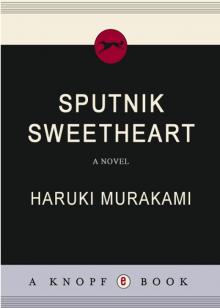 Sputnik Sweetheart
Sputnik Sweetheart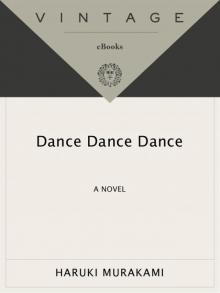 Dance Dance Dance
Dance Dance Dance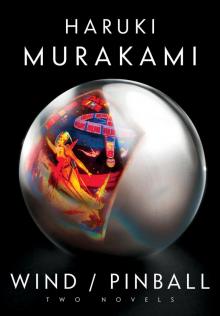 The Wind (1) and Up Bird Chronicle (2)
The Wind (1) and Up Bird Chronicle (2) Blind Willow, Sleeping Woman
Blind Willow, Sleeping Woman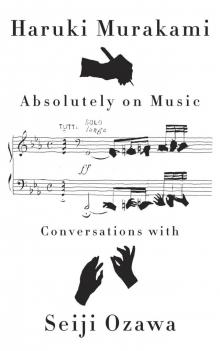 Absolutely on Music: Conversations With Seiji Ozawa
Absolutely on Music: Conversations With Seiji Ozawa Norwegian Wood
Norwegian Wood South of the Border, West of the Sun
South of the Border, West of the Sun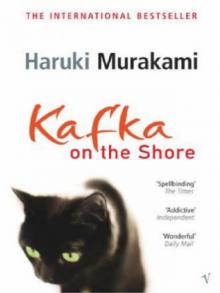 Kafka on the Shore
Kafka on the Shore Men Without Women
Men Without Women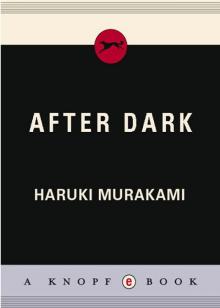 After Dark
After Dark Hard-Boiled Wonderland and the End of the World
Hard-Boiled Wonderland and the End of the World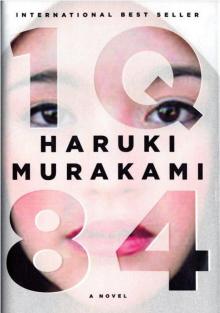 1q84
1q84 The Wind-Up Bird Chronicle
The Wind-Up Bird Chronicle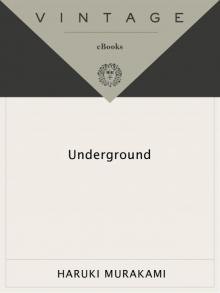 Underground: The Tokyo Gas Attack and the Japanese Psyche
Underground: The Tokyo Gas Attack and the Japanese Psyche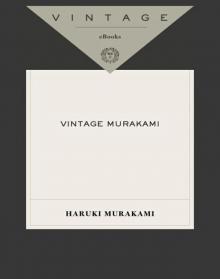 Vintage Murakami
Vintage Murakami The Elephant Vanishes: Stories
The Elephant Vanishes: Stories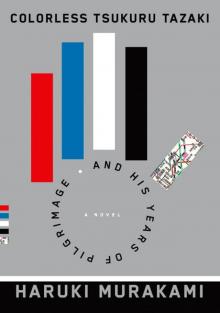 Colorless Tsukuru Tazaki and His Years of Pilgrimage
Colorless Tsukuru Tazaki and His Years of Pilgrimage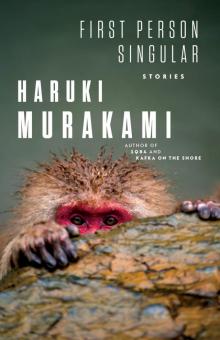 First Person Singular
First Person Singular After the Quake
After the Quake A Wild Sheep Chase
A Wild Sheep Chase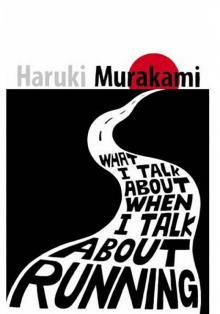 What I Talk About When I Talk About Running
What I Talk About When I Talk About Running Birthday Girl
Birthday Girl The Elephant Vanishes
The Elephant Vanishes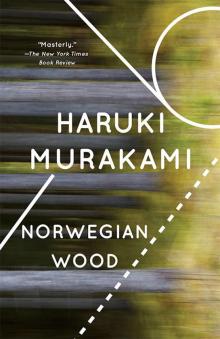 Norwegian Wood (Vintage International)
Norwegian Wood (Vintage International)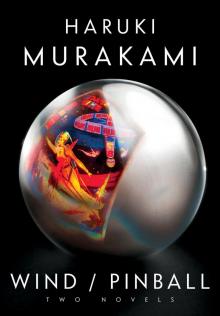 Wind/Pinball
Wind/Pinball Norwegian Wood Vol 1.
Norwegian Wood Vol 1. Underground
Underground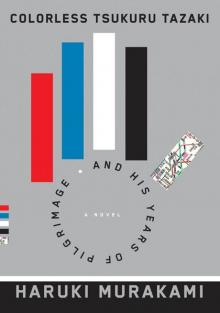 Colorless Tsukuru Tazaki and His Years of Pilgrimage: A novel
Colorless Tsukuru Tazaki and His Years of Pilgrimage: A novel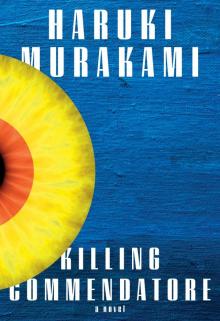 Killing Commendatore
Killing Commendatore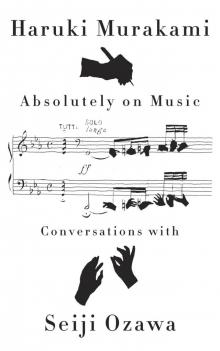 Absolutely on Music
Absolutely on Music